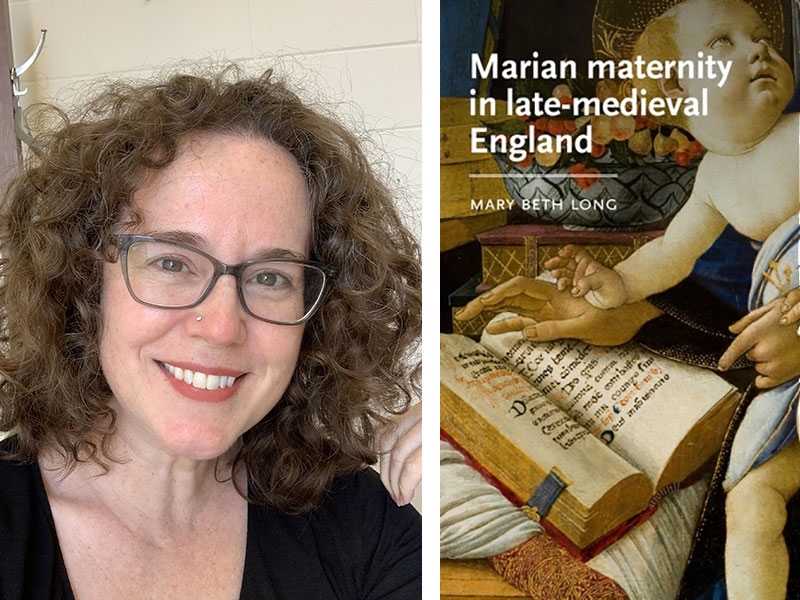The Department of English is pleased to announce the release of assistant professor Mary Beth Long's new book, Marian Maternity in Late-Medieval England, published by Manchester University Press in September.
Fifteenth-century England had an intense interest in the Virgin Mary, the best-documented mother of the medieval period. By analyzing manuscripts written, copied or translated during that time, Long, in her book, examines how Mary's maternity was described in vernacular texts, focusing on women's private devotional reading.
"That seemed the most likely way to learn what kinds of messages late-medieval moms were getting about how the Virgin Mary mothered her very famous child," Long said.
Some of the authors are well-known, such as Geoffrey Chaucer and Margery Kempe, but a lot of them are still anonymous. Since Mary's maternity was both a theological concept and, in the 15th century, imitable practice, Long looks at internal cues in the texts, at manuscript contexts and at the evidence of late-medieval readers' interactions with them.
Explaining her interest in writing on this topic, Long said, "I'm intrigued by how cultures form their ideals of motherhood and how those ideals shape or conflict maternal practice—that is, the way people actually parent or attempt to raise children. Our own culture tends to put a lot of pressure on mothers, specifically, and I was curious about where all that blame and shame comes from. Because Mary still gets held up as an ideal of womanhood and motherhood, she seemed like a good starting point for answering that question."
The process of completing the book was a multi-year endeavor for Long. She accrued evidence for the project from multiple summers spent working in European archives, beginning with her dissertation research. Since then, she has steadily finished bits and pieces, wrapping up the first full draft of the book during 2020 and 2021. Most of 2022 was spent revising it.
Of course, writing in 2020 and 2021, during the pandemic and in the full-time company of four children at home, no less, was challenging for Long.
"I really missed Mullins Library's much-appreciated services and access to quiet writing space," Long said, "not to mention the ability to travel to archives. The book's first draft came from whatever material I happened to have in the house or was available online when COVID hit."
Completing the book, however, was also a rewarding experience for Long, in both scholarly and personal terms.
"A lot of emotional work went into writing about the book's sub-topics such as grief, birth, systemic oppressions and the social support that raising children demands," Long explained. "Those topics emerged from my closely reading many, many medieval texts, so at the end of the project, 'mothering' meant something broader and much more complex to me than it had at the beginning. That kind of learning feels meaningful."
While Long acknowledged that other medievalists will get the most out of her book, she was considering a broader audience when she was composing it: "I wrote it while thinking of other people who mother children, in whatever capacity falls to them."
For her next project, Long is currently writing a critical edition of the life and trials of Margaret Clitherow, a 16th-century English Catholic martyr and mother of three. Clitherow ran a home school and hid priests in her house when Catholicism was essentially illegal, for which she was pressed to death while likely pregnant.
"Just about every aspect of her story raises fascinating questions," said Long, "so I'm excited about trying to answer them."
Topics
Contacts
Leigh Sparks, assistant director of the graduate program in English
Department of English
479-575-5659,
